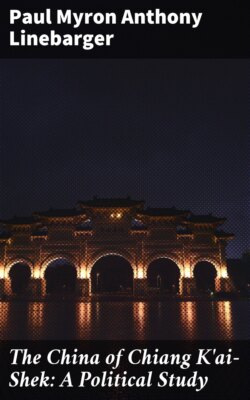Читать книгу The China of Chiang K'ai-Shek: A Political Study - Paul Myron Anthony Linebarger - Страница 20
На сайте Литреса книга снята с продажи.
The Executive Yüan
ОглавлениеTable of Contents
The Executive Yüan is the political organ which includes the ministries, and is therefore roughly analogous to a cabinet, just as the Council of State is in loose parallel to a Privy Council. Together with the Supreme National Defense Council and the Military Affairs Commission, it exercises actual control over the National Government in war time. Its growth involves executive giantism, and atrophy for the remaining Yüan. The President (Yüan-chang) of the Executive Yüan (Hsing-chêng Yüan) is the highest executive officer of the government. This post has not always been held by Chiang K'ai-shek. At various times Wang Ch'ing-wei (now in Nanking) and H. H. K'ung (now Minister of Finance and Vice-President [Fu-yüan-chang] of the Yüan) have held this office.
The Executive Yüan may be compared to a parliamentary cabinet in respect to its relations to the President of the National Government, but it possesses no authority whatever over the Supreme National Defense Council, nor over the Kuomintang C. E. C. and the Kuomintang Congress. It cannot ask for its own dissolution, nor demand the dissolution of the higher policy-making agency whose will it executes.[15] It resembles a cabinet, therefore, in its service as a consultative and unifying agency for the entire executive, but differs in its lack of controlling interdependence with a broad parliament. Again, the Yüan is unique among national executive agencies in the modern world with respect to its division of the task of policy-making and policy-supervising. Most cabinets consist of meetings of the heads of executive ministries or departments, with the chief executive officer presiding, but have no elaborate secretarial or administrative machinery interposed between the cabinet and its direct subordinates (departments or ministries). The Executive Yüan is peculiar in possessing two elaborate staff agencies which handle as much routine work as possible, act as a clearing house for policy and general administration, and pre-digest a maximum of problems. The outline on p. 58 illustrates the difference.
All matters short of the most critical moment are referred to one or the other of the two staff organs (Mi-shu Ch'u or Secretariat, under a Secretary-General; and Chêng-wu Ch'u, or Office of Political Affairs,[16] under a Director of Political Affairs), which are nominally separate but actually almost fused, with the Director serving as a sort of assistant Secretary-General. All official business (other than crucial matters raised by the members of the Meeting) comes to these agencies, where it is studied, assorted, and usually settled provisionally, pending only formal ratification by the Meeting of the Executive Yüan.
The Executive Yüan Meeting occurs once weekly, most commonly on Tuesday.[17] Each Meeting is presented with a formidable agenda, prepared by the Secretary-General, and divided into three categories: reports, matters for discussion, and appointments. The membership of the Meeting consists of the Yüan President and Vice-President, the Ministers heading the executive Ministries, and the Chairmen of Commissions having the rank of Ministry.[18] The work of the Meeting is carried on in a business-like fashion. The Generalissimo, as incumbent Yüan President, takes great interest in the work of the Yüan, and makes faithfulness and punctuality in attendance a matter of high importance. Because of the Japanese air raids over the capital, the exact place and hour of the weekly meeting are not announced, nor are the proceedings public.
In giving effect to the decisions reached by the Yüan Meeting, the Yüan itself issues orders in its own name for matters which are of general interest, or which cannot be handled by any single Ministry or Commission. If the problem is within the province of a particular agency, the Yüan—through its Secretariat—addresses the appropriate form of intragovernmental communication, and the decision is then set forth as the order or act of the agency involved. The following subjects are within the jurisdiction of the Executive Yüan:
(1) laws or legal problems submitted for promulgation by the Legislative Yüan;
(2) the budget, also passed pro forma by the Council of State and put into legal form by the Legislative Yüan;
(3) declarations of war and peace, on the motion of the Legislative Yüan;
(4) appointment and discharge of the higher ranks of officials;
(5) matters which cannot be settled by a single Ministry or Commission;
(6) other matters which the Yüan President sees fit to introduce for discussion or decision.
The Executive Yüan has far outstripped all other Yüan in war-time growth. Its central position, the urgency of most government business, and the need for speed have led to this. Executive exercise of the ordinance-making power has led to the gradual desuetude of the Legislative Yüan, which has found ample work in the preparation of the Draft Permanent Constitution and the attempt to systematize legislation in view of rapid territorial and administrative change. The Executive Yüan, by controlling personnel, usually short-circuits the functions of the Examination and Control Yüan; and the Judicial Yüan has never had practical political parity. Hence, the five-power system must be regarded as a system with strong executive, weaker legislative, examinative, and censoral, and dependent judicial divisions. Above the five powers, the Supreme National Defense Council exercises its august authority; within them, the Executive stands forth; and to them, in the course of the war, a new agency, almost comparable to a sixth yüan, has sprung forth with an elaborate bureaucracy of its own: the Military Affairs Commission.
